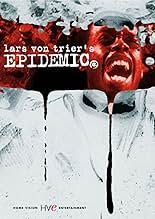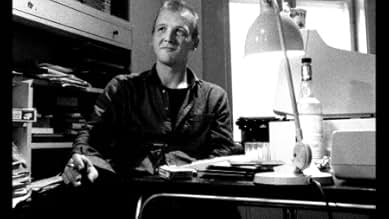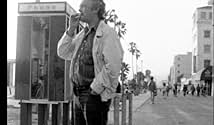CALIFICACIÓN DE IMDb
5.9/10
6.5 k
TU CALIFICACIÓN
Un director y un guionista se encuentran escribiendo un guion y, en el proceso, la línea entre la ficción y la realidad desaparece.Un director y un guionista se encuentran escribiendo un guion y, en el proceso, la línea entre la ficción y la realidad desaparece.Un director y un guionista se encuentran escribiendo un guion y, en el proceso, la línea entre la ficción y la realidad desaparece.
- Dirección
- Guionistas
- Elenco
- Premios
- 1 nominación en total
- Dirección
- Guionistas
- Todo el elenco y el equipo
- Producción, taquilla y más en IMDbPro
Opiniones destacadas
The idea of the film is great. Mixing the creation of a movie and his viewing. It's done in a very ambitious way, incredibly sophisticated and elegant when we know the budget who was assigned to the movie.
A lot of scenes are incredible, specially the one who shows the contamination of the priest, adding a reflection on the condition of the black man. Obviously the last scene is one of the most incredible things I've seen on a screen, but we can doubt the mental health of Von Trier and his crew. However maybe it's the reason he's so good...
I didn't like a few things. I think there is too much time about the creation of the movie, a few ridiculous and unappropriated moments as the story of the American letters of Niels
A lot of scenes are incredible, specially the one who shows the contamination of the priest, adding a reflection on the condition of the black man. Obviously the last scene is one of the most incredible things I've seen on a screen, but we can doubt the mental health of Von Trier and his crew. However maybe it's the reason he's so good...
I didn't like a few things. I think there is too much time about the creation of the movie, a few ridiculous and unappropriated moments as the story of the American letters of Niels
Epidemic (1987), directed by Lars von Trier, is a meta-cinematic exploration of the blurred line between fiction and reality. The film follows a director and screenwriter who, while working on a script about a plague, find themselves caught up in a real-life epidemic, mirroring the events they are writing. This film is a challenging and unconventional piece of work, characteristic of von Trier's early style, marked by its fragmented narrative and philosophical underpinnings.
The performances are fittingly restrained, with Allan De Waal and Ole Ernst bringing a sense of detachment and intellectual depth to their characters, reflecting the film's thematic concerns. The film's low-budget aesthetic, with shaky handheld camerawork and raw sound design, serves to reinforce the sense of chaos and uncertainty that permeates the narrative. It's a deliberate stylistic choice that enhances the surreal, almost documentary-like atmosphere, but it may be off-putting to some viewers who prefer more polished filmmaking.
Von Trier's direction is methodical, and while the premise of the film offers intriguing possibilities, the execution can feel disjointed and unclear at times. The dialogue often veers into abstract territory, and the narrative structure is fragmented, leaving viewers to piece together the meaning behind the events. The film's slow pace, combined with its minimalistic style, can make it feel like a deliberately inaccessible work, challenging the audience's patience.
Epidemic is a film that operates on multiple levels, blending political, artistic, and existential commentary with a quasi-documentary style. While it offers some thought-provoking moments, it struggles to maintain coherence and impact over its runtime. It is best suited for those interested in avant-garde cinema or those looking to delve into the early works of Lars von Trier, but casual viewers may find it frustrating.
Rating: 6/10. A provocative, if uneven, exploration of the intersection between art, reality, and societal collapse.
The performances are fittingly restrained, with Allan De Waal and Ole Ernst bringing a sense of detachment and intellectual depth to their characters, reflecting the film's thematic concerns. The film's low-budget aesthetic, with shaky handheld camerawork and raw sound design, serves to reinforce the sense of chaos and uncertainty that permeates the narrative. It's a deliberate stylistic choice that enhances the surreal, almost documentary-like atmosphere, but it may be off-putting to some viewers who prefer more polished filmmaking.
Von Trier's direction is methodical, and while the premise of the film offers intriguing possibilities, the execution can feel disjointed and unclear at times. The dialogue often veers into abstract territory, and the narrative structure is fragmented, leaving viewers to piece together the meaning behind the events. The film's slow pace, combined with its minimalistic style, can make it feel like a deliberately inaccessible work, challenging the audience's patience.
Epidemic is a film that operates on multiple levels, blending political, artistic, and existential commentary with a quasi-documentary style. While it offers some thought-provoking moments, it struggles to maintain coherence and impact over its runtime. It is best suited for those interested in avant-garde cinema or those looking to delve into the early works of Lars von Trier, but casual viewers may find it frustrating.
Rating: 6/10. A provocative, if uneven, exploration of the intersection between art, reality, and societal collapse.
"Epidemic" is, at its heart of hearts, a movie about making movies. As such it challenges the relation between fiction and reality. The two are not statically established realms, self contained in their clearly contained functional domains but they are dynamically interacting at all levels and at all times. The result is a movie in which the narrative structure is dual and of a meandering nature, climaxing in what could be a merge between a programmed project that involves human intellectual intervention- the movie within the movie- and the outbreak of a natural phenomenon with its catastrophic consequences- the epidemic.
Styllistically, "Epidemic" is very much a Lars Trier movie and it shows. From the apparently disconnected flow of scenes to mix of gritty realism with allegory, the director imprints his very personal mark in all elements of "Epidemic". Its very structure attests to this and the imagery reflects it in a very overt manner. "Epidemic" seems to be a playing ground of sorts in which Lars von Trier experiments as much as possible and in trying different things creates a diverse mismatch of scenes that not always work completely well together although they create an atmosphere.
As the process of coalescence between "fiction" and "reality" (this reality being, of course, fictional in itself which adds another layer of complexity and challenges the very notion of the third and fourth walls) heightens the narrative frame shrinks from the stage that is Europe to a small room. The claustrophobia of the later phase of the movie bring the full impact of the plague to the viewer's attention via a limited sample of the population that permits a personal experience of it all.
Much like Bergman's "The Seventh Seal", the plague in question is to be read on many levels and very much like the Swedish director's movie, "Epidemic" is not for everyone. Those who find it interesting, however, may have a strangely riveting experience upon watching this clearly unconventional movie that pushes many borders even if does not do so in a completely coherent manner.
Styllistically, "Epidemic" is very much a Lars Trier movie and it shows. From the apparently disconnected flow of scenes to mix of gritty realism with allegory, the director imprints his very personal mark in all elements of "Epidemic". Its very structure attests to this and the imagery reflects it in a very overt manner. "Epidemic" seems to be a playing ground of sorts in which Lars von Trier experiments as much as possible and in trying different things creates a diverse mismatch of scenes that not always work completely well together although they create an atmosphere.
As the process of coalescence between "fiction" and "reality" (this reality being, of course, fictional in itself which adds another layer of complexity and challenges the very notion of the third and fourth walls) heightens the narrative frame shrinks from the stage that is Europe to a small room. The claustrophobia of the later phase of the movie bring the full impact of the plague to the viewer's attention via a limited sample of the population that permits a personal experience of it all.
Much like Bergman's "The Seventh Seal", the plague in question is to be read on many levels and very much like the Swedish director's movie, "Epidemic" is not for everyone. Those who find it interesting, however, may have a strangely riveting experience upon watching this clearly unconventional movie that pushes many borders even if does not do so in a completely coherent manner.
Look, I know a substantial proportion of the American population get a little hot under the collar when funny-talking foreigners start criticising the American government and way of life, but hey - when you're the only country in the world inclined to and capable of dictation of world policy, you gotta take it on the chin. While Von Trier even makes me wince sometimes (the end credits to Dogville for instance), it's his point of view and is worthy of thought. He isn't here to lick your derrière clean for you - if you can't take a little criticism of the homeland, I'd steer clear of any imported movies for a while. Anyhoo, when truly disrespectful films like Titanic break records and reap awards with nary a raised eyebrow, it's double standards to expect non-US films to walk the line you'd like. Von Trier is a genius film-maker... you may not agree with his politics, but you cannot doubt his talent.
Another entry in my search to see a bunch of films about disease outbreaks, "Epidemic" is conceptually intriguing, but the actual execution is dreadful. It's amateurish, and Lars von Trier and Niels Vørsel, scenarists within and without the film, seem to have approached the entire thing as a joke; the end result being that the film itself is one. And, for crying out loud, take that damn red watermark of a title off the screen already! Seriously, the title, "Epidemic," along with an e in a circle, is in the upper left side of the image for most of the picture--and in red in an otherwise black-and-white film. I thought there was something wrong with the DVD or my home-viewing equipment--I'm still not entirely sure, because it makes no sense why the title would remain there for the rest of the whole movie. The lousy lighting and noisy photography, from what mostly seems to be 16mm film, is rather a blessing in this regard, as it sometimes obscures the ever present title in indiscernible darkness. Besides that, I also wanted to smack the smirks off their faces most of the time. Stop laughing, guys; none of this is amusing except, perhaps, for part of the ending. Aside from the Grand Guignol, my favorite part has the screenwriters' boss deploring the two's lack of a full script, for which they were hired, and deploring their film's ending, which he says is "pathetic" at best.
What there is is a skeleton of a script and a plotline painted on a wall. Literally, this is what is shown in the film for the writing of the film-within-the-film, also titled "Epidemic," and it's believable that's all they really did write for this entire film. I believe they mention this lack of planning in the DVD commentary, on which the two otherwise spend most of the time giggling at themselves giggling in the stupid movie. It's obnoxious. Hard to believe one of them, von Trier, went on to be the most famous Scandinavian filmmaker since Ingmar Bergman. Regardless, the premise of the thing was promising, of the film-within-the-film infecting the outer narrative--the movie as monster, as the source of the epidemic--as the writers in the outer one have likewise been infecting the inner film. These sort of meta narratives are catnip to me, so one needs to go out of their way or, rather in this case, not go out of their way at all, to dissuade me of it.
The film even begins with what seems to have been a waste of a good pun by not making clear that their script is lost to some sort of computer "virus," with the other sort of virus deadly to people occupying the film they decide to write after losing their previous effort, which apparently was so bad they can't even remember it so as to re-write the thing. From there, we get a shaggy-dog story--like the first car ride that goes nowhere, as do several of the film's other rambling detours. The texting while driving gag--with a typewriter (this being 1987) isn't bad. At least Udo Kier's scene is an interesting telling of his birthday, too, but otherwise we get pretentious wine tasting, a story of Vørsel's creepy correspondence with teenage girls from Atlantic City, and a woman hypnotized into the film-within-the-film who bawls and screams over how awful "Epidemic" is. I didn't think it was that bad, but it was a chore to finish it.
What there is is a skeleton of a script and a plotline painted on a wall. Literally, this is what is shown in the film for the writing of the film-within-the-film, also titled "Epidemic," and it's believable that's all they really did write for this entire film. I believe they mention this lack of planning in the DVD commentary, on which the two otherwise spend most of the time giggling at themselves giggling in the stupid movie. It's obnoxious. Hard to believe one of them, von Trier, went on to be the most famous Scandinavian filmmaker since Ingmar Bergman. Regardless, the premise of the thing was promising, of the film-within-the-film infecting the outer narrative--the movie as monster, as the source of the epidemic--as the writers in the outer one have likewise been infecting the inner film. These sort of meta narratives are catnip to me, so one needs to go out of their way or, rather in this case, not go out of their way at all, to dissuade me of it.
The film even begins with what seems to have been a waste of a good pun by not making clear that their script is lost to some sort of computer "virus," with the other sort of virus deadly to people occupying the film they decide to write after losing their previous effort, which apparently was so bad they can't even remember it so as to re-write the thing. From there, we get a shaggy-dog story--like the first car ride that goes nowhere, as do several of the film's other rambling detours. The texting while driving gag--with a typewriter (this being 1987) isn't bad. At least Udo Kier's scene is an interesting telling of his birthday, too, but otherwise we get pretentious wine tasting, a story of Vørsel's creepy correspondence with teenage girls from Atlantic City, and a woman hypnotized into the film-within-the-film who bawls and screams over how awful "Epidemic" is. I didn't think it was that bad, but it was a chore to finish it.
¿Sabías que…?
- Créditos curiososThe film's title appears in red letters in the upper left corner of the screen for the entire length of the film.
- ConexionesFeatured in The Making of 'Europa' (1991)
- Bandas sonorasTannhäuser (The Overture)
Composed by Richard Wagner
Selecciones populares
Inicia sesión para calificar y agrega a la lista de videos para obtener recomendaciones personalizadas
- How long is Epidemic?Con tecnología de Alexa
Detalles
Taquilla
- Total a nivel mundial
- USD 938
- Tiempo de ejecución1 hora 46 minutos
- Color
- Mezcla de sonido
- Relación de aspecto
- 1.66 : 1
Contribuir a esta página
Sugiere una edición o agrega el contenido que falta

Principales brechas de datos
By what name was Epidemic (1987) officially released in India in English?
Responda


















